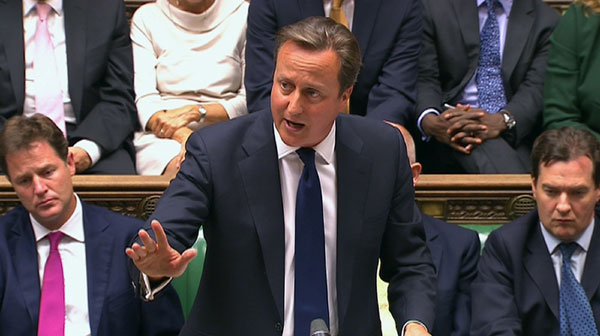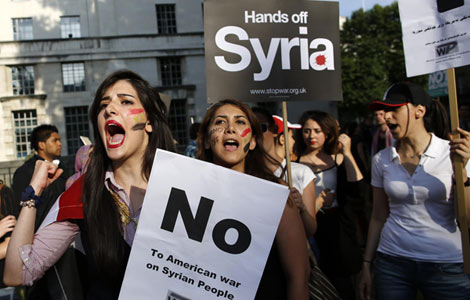US readies possible solo action against Syria
Updated: 2013-08-30 10:49
(Agencies)
|
||||||||
 |
|
Britain's Prime Minister David Cameron is seen addressing the House of Commons in this still image taken from video in London August 29, 2013. [Photo/Agencies] |
In London, Prime Minister David Cameron argued a military strike would be legal on humanitarian grounds. But he faced deep pressure from lawmakers and had already promised not to undertake military action until a UN chemical weapons team on the ground in Syria released its findings about the August 21 attack.
The prime minister said in terse comments after the vote that while he believes in a "tough response" to the use of chemical weapons, he would respect the will of the House of Commons.
Caitlin Hayden, Obama's National Security Council spokeswoman, said the US would continue to consult with Britain but Obama would make decisions based on "the best interests of the United States".
It was not certain the US would have to act alone. France announced that its armed forces "have been put in position to respond" if President Francois Hollande commits forces to intervention against Syria. Hollande does not need French parliamentary approval to launch military action that lasts less than four months.
Obama discussed the situation in Syria with Republican House Speaker John Boehner, who wrote to the president earlier this week seeking a legal justification for a military strike and the objectives of any potential action.
Assad, who has denied using chemical weapons, vowed his country "will defend itself against any aggression".
Some of the UN chemical weapons experts will travel directly from Syria on Saturday to different laboratories around Europe to deliver "an extensive amount of material" gathered, UN spokesman Farhan Haq said. While the mandate of the UN team is to determine whether chemical agents were used in the attack, not who was responsible, Haq suggested the evidence - which includes biological samples and witness interviews - might give an indication of who deployed gases.
Obama and other top officials have not revealed definitive evidence to back claims that Assad used chemical weapons on Syrians. US officials say the intelligence assessments are no "slam dunk", with questions remaining about who actually controls some of Syria's chemical weapons stores and doubts about whether Assad himself ordered the strike.
The officials spoke on condition of anonymity because they were not authorized to discuss the intelligence publicly.
Despite shortcomings in the intelligence, the White House signaled urgency in acting, with Earnest, the White House spokesman saying the president believes there is a "compressed time frame" for responding.
Obama continued making his case for a robust response to world leaders, speaking Thursday with German Chancellor Angela Merkel. With national elections scheduled in Germany for next month, Merkel is unlikely to pull her country into a military conflict.
Merkel also discussed Syria by phone Thursday with Russian President Vladimir Putin, insisting that the attack "requires an international reaction," Merkel spokesman Steffen Seibert said.
Obama has ruled out putting American forces on the ground in Syria or setting up a no-fly zone over the country. He's also said any US response to the chemical weapons attack would be limited in scope and aimed solely at punishing Assad for deploying deadly gases, not at regime change.
"We do have to make sure that when countries break international norms on weapons like chemical weapons that could threaten us, that they are held accountable," he said during a television interview.
The most likely military option would be Tomahawk cruise missile strikes from four Navy destroyers in the eastern Mediterranean Sea. At a minimum, Western forces are expected to strike targets that symbolize Assad's military and political might: military and national police headquarters, including the Defense Ministry; the Syrian military's general staff; and the four-brigade Republican Guard that is in charge of protecting Damascus, Assad's seat of power. Assad's ruling Baath Party headquarters could be targeted, too.
US officials also are considering attacking military command centers and vital forces, communications hubs and weapons caches, including ballistic missile batteries.
- No military solution in Syria, either
- War fears disrupting trade with Syria
- Obama makes case for Syria strike, British house votes no
- Chinese petroleum firm already leave Syria: MOC
- Fifth US destroyer dispatched near Syria: report
- Syria to 'decisively' respond to foreign military action
- Assad says to defend Syria against any aggression
- China calls for restraint on Syria crisis
- Britain to submit Syria resolution to UN
- Russian FM warns against military solution in Syria

 Chinese Films in the US: Not a full house
Chinese Films in the US: Not a full house
 Jeremy Lin's campaign of animal protection
Jeremy Lin's campaign of animal protection
 Solar panel maker hits milestone
Solar panel maker hits milestone
 Vineyards pour billions into chateaus
Vineyards pour billions into chateaus
 Foreigners given opportunities to shine
Foreigners given opportunities to shine
 Fair brings Hami melons to Beijing
Fair brings Hami melons to Beijing
 Court sentences 56 for telecom scam
Court sentences 56 for telecom scam
 US vows action in Syria even without UN backing
US vows action in Syria even without UN backing
Most Viewed
Editor's Picks

|

|

|

|

|

|
Today's Top News
Chinese shifting attention to US stock markets
Washington State governor plans Chinese mission
US readies possible solo action against Syria
Fed's taper is a key issue for G20
Visa issues resolved in new policy
Xiaomi hires Google exec
Trending news across China
Solar panel maker hits milestone
US Weekly

|

|






